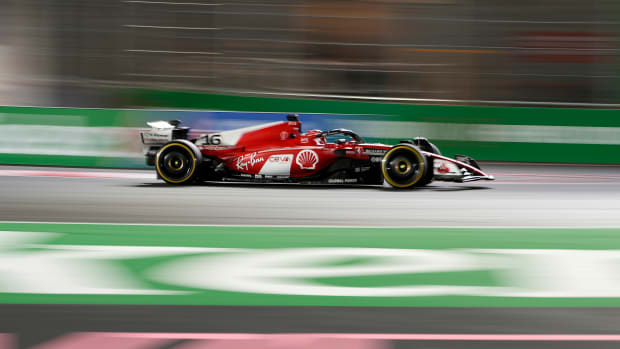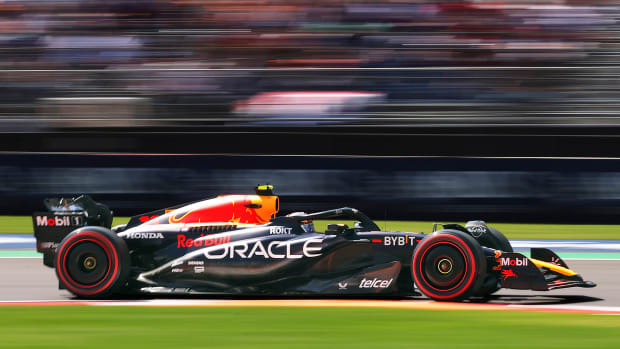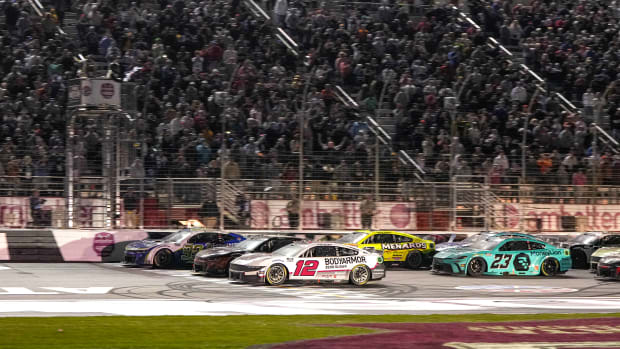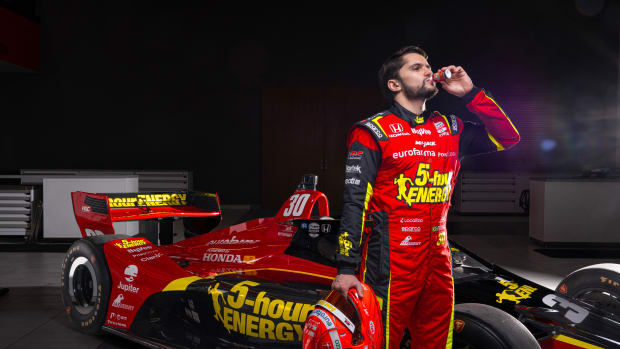NASCAR should prove it's colorblind, ban confederate flag from racetracks
Joe Henderson III still remembers his maiden pilgrimage to Talladega Superspeedway. It was in the spring of 2004. He was 18 and making the drive to the famed haunted house of speed from Nashville, Tenn., with his father.
This pair was more than just massive racing fans. They had skin in the game. Back in the day, Joe Jr. had crewed for Wendell Scott, stock car racing’s Jackie Robinson. Now, Joe III was making a name for himself as an up-and-coming driver. In fact, it was the kid’s budding career prospects that had lured father and son to east central Alabama. There, Henderson would be announced as the first member of Drive for Diversity, a NASCAR pilot program intended to goose minority participation. The mood inside the car was one of excitement.
But all that changed when they turned off I-20 and onto the main drag leading to the speedway. Lording over them was a billboard “probably about a big as the side of a house,” the younger Henderson recalls. In a spray painted script, the sign screamed “Welcome to Redneck Country.” Even bigger than the type were the stars and bars in the backdrop. “If any sane African-American fan would’ve had the courage to come down there for a race,” he continues, “their mind state would have to be, Anything can happen. Brace for the worst.”
• MORE COVERAGE: NASCAR standings after Sonoma | Coke 400 preview
The optics remain ever grim this weekend, as NASCAR returns to Daytona, Fla., where the confederate flags fly at full mast and incite feelings of fear and dread. This is after NASCAR chairman Brian France forcefully condemned the flag, Dale Earnhardt Jr. echoed France’s sentiments, and all 30 of the sport’s national touring series tracks essentially urged fans to please leave their rebel banners at home. While this has been long been the sport’s position, it became worth restating—again and again—after nine African Americans were fatally gunned down inside a historically black church in Charleston by a confederate flag-waving white supremacist two weeks ago. This week, Daytona Speedway officials even went as far as offering fans the opportunity to trade their offensive flags for Old Glory. (You know, for Fourth of July weekend?) But as of press time they found no takers, perhaps because the irony of this gesture—of a piece with a larger, stranger strain of politeness—is lost on the entire sport.
NASCAR has been immensely tolerant of a group of fans that, by their decision to fly a standard of white supremacy, would appear to be anything but. However, if indeed the sport were serious about disassociating itself from such displays, it would stop with the niceties and ban the flag outright. Quite simply, a ban is a silver bullet, one that would delineate fans of racing from fans of racism. It would prove that France is indeed one of the few league executives in sports with seemingly absolute power and the temerity to wield it in service of a greater good. If he can pull the Xfinity and truck series banquets from Donald Trump’s resorts based on The Donald’s tone-deaf (is there ever any other kind with him?) comments on immigration, France can do this too. It would show just how serious his league is about joining the 21st century.
Of course, NASCAR is hardly the only sport born of a prejudicial tradition. The NFL, the NBA and MLB—just to name three leagues that the stock car racing leviathan threatened to leave in its dust—all began as cloistered playgrounds for white men. And so they remained until a brave few began storming the gates and crossing the color line. By the 1950s, the other three sports were well on the way to becoming fully integrated and fans more accepting.
Compare that to NASCAR, which, by some miracle of modern marketing, grew to be nearly as big as a stick-and-ball sport despite producing a handful of non-white male drivers starting with Scott in 1952. And if that weren’t shameful enough, fans cheer on their good ol’ boys while waving their rebel flag like Pom Poms. A similar demonstration would get a ticketholder booted from just about any other arena.
NASCAR could do the same, if they weren’t so afraid of inciting a mass exodus from the sport. But, really, what would be the harm in letting the bad apples go? True, there would be the immediate revenue shortfall from all of those empty seats and parking spaces. But NASCAR’s audience, live and on TV, is shrinking anyway. Losing 5,000 fans at the track over the short term could well bring back 10,000 fans over the long haul. Minorities could well be the engine behind this growth.
Danica Patrick, F1's Lewis Hamilton grapple with racing's sexism
Car culture, after all, isn’t nearly as monochromatic as NASCAR culture. Minorities spend as much money on Chevys and Fords and Toyotas as anyone, and spend even more in the aftermarket on maintenance and modifications. They drag race between stoplights, drift up and down parking lot garages and, just two months ago, waded into the edgy city center of Baltimore on bikes. It’s no accident that the cast of the “Fast and Furious” is arguably the most multi-ethnic of any major movie franchise. Speed is a part of the human condition.
By keeping the confederate flag as part of its culture, whether frowning upon it or not, NASCAR is essentially waving the white flag. It’s telling a smart, curious and massive audience on the sidelines to take their hundreds of millions in disposable income and spend it on football tickets, a basketball game, a movie—anything but a NASCAR race. If there’s cold comfort, it’s that they’re in no danger of losing any of those potential fans to IndyCar or Formula 1, which are motorsports that don’t make a practice of flying the confederate flag and yet, in the minds of the many who think of racing as one big monolith, are guilty by association. This, despite the fact that IndyCar at least can rest on a legacy as a proving ground for gender pioneers, and Formula 1’s biggest star is a diamond-earring-wearing, Pussycat-doll-dating young Englishman named Lewis Hamilton.
• MORE COVERAGE: Scott elected to Hall of Fame | Dale: Chase starts now
NASCAR could go the same route. In fact, there’s a kid racing in the Xfinity series right now named Darrell Wallace who is fast trending toward a career as a winning Cup driver. Few are more keen to see him succeed than Henderson, who is still chasing the dream as a 30-year-old, even as he works as a hotel manager to help support his wife and young daughter. A career that was once primed with promise was long ago derailed by politics. As it turns out, his father was wrong. Henderson wasn’t born at the right time. How lucky for Henderson that his father, who died in 2013, never lived to see just how wrong he was. The idea that confederate flags could be out in full force heading into a race that, just a year ago, was won by Aric Almirola, NASCAR’s most prominent Hispanic driver, hardly smacks of progress.
But instead of forcing a change in attitude, NASCAR hesitates to rock the boat and, in so doing, remains painfully adrift. It doesn’t have to be that way. In all likelihood, those fans aren’t going anywhere. Tell them the confederate flag is the only thing that is not welcome in NASCAR, that it tramples upon the inroads to inclusion that the sport has made over the past decade. If necessary, put it in terms they might better understand: join or die. That would make it clear that NASCAR is colorblind to everything but the cars on the grid.




